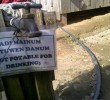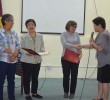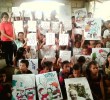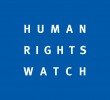Fifteen people, who were orphaned as children, the majority of them women in their twenties and thirties, may find themselves homeless as of today in the town of Kor�a in south-east Albania. A similar threat reportedly hangs over some 40 other adults who were orphaned children in Shkodёr in northern Albania. If these evictions take place, without ensuring adequate alternative accommodation to those affected, Albania will breach its obligations under international and regional human rights law, Amnesty International said.
Those currently accommodated in the student residential hall (�konvikt� in Albanian) of the �Demir Progri� vocational middle school in Kor�a have relied throughout their lives on institutional care as they lack family support. As a result of the planned evictions they risk being left on the street. The local authorities, who are renovating the building for use by students at the school, have not taken steps to secure them any alternative housing. The 15 people have lived in a part of this konvikt, in six rooms, for over 10 years. As they were not allocated housing after finishing school, they stayed on in two floors of the building, which is reportedly in appearance, a complete ruin, but in fact their only home. They are reportedly unemployed or work as dressmakers, and unable to afford the rent for housing on the open market. Since 1996, 11 others who were orphaned as children (nine young women and two young men), who also once lived in this konvikt, have gone missing.
Reports indicate that some may have been trafficked for exploitation as prostitutes or have been recruited for criminal
activity.
�Orphans are extremely vulnerable; they lack the support of the family, which for most Albanians is their main or only safety net in times of trouble,� said Nicola Duckworth, Director of Amnesty International�s Europe and Central Asia Programme.
�Amnesty International deplores the failure, on the part of the Albanian authorities, to respect and implement their obligations towards orphaned children. In implementing the evictions the Albanian authorities would be effectively washing their hands of those most in need of their protection.�
Albanian law grants orphans priority in housing and employment on completion of their education at the age of 18, with the aim of protecting them and integrating them into society. However, the current situation of several hundred people who were orphaned children demonstrates how far from reality this law is. The right to adequate housing is guaranteed in international law, under Article 11 of the International Covenant on Economic, Social and Cultural Rights, ratified by Albania.
Like other Albanian cities, Kor�a suffers from a housing shortage. Although the Mayor of Kor�a has recently promised that orphans and invalids would be given priority in the allocation of 80 apartments for the homeless to be finished this year, Albanian orphans� organizations complain that such promises, at central and at local level, have generally been broken.
Amnesty International calls on Kor�a municipal authorities not to proceed with the threatened eviction, until such time as it can provide those affected with adequate alternative housing. Furthermore, the organisation urges the central and local authorities and their international partners to ensure that the state�s legal obligations to all orphans are implemented, and to take targeted and effective steps, as a matter of priority to ensure the right to adequate housing for adults who were orphaned children.
According to associations representing Albanian orphans, there are altogether over 300 people who were orphaned as children, mostly aged between 20 and 40 years, living in similarly squalid conditions in dilapidated sections of konvikts in Albanian cities. Like those in Kor�a, they were not provided with housing on finishing middle school, and since then the authorities have failed to protect their right to adequate housing.
“With few qualifications, often unemployed or living from hand to mouth by casual labour, adults who were orphaned as children are likely to become demoralized, marginalized and isolated from the rest of society in these ‘orphan ghettoes�,” Nicola Duckworth said.
�These disadvantages, combined with the social stigma of being an orphan, can often undermine their right to family life and their ability to create warm and stable homes for themselves and their own children.�
Background
In April this year, Amnesty International delegates visited a number of konvikts in Tirana and Shkodёr, where certain floors or sections are occupied by adults who have been in state residential care since they were orphaned as children. The delegates found rooms inhabited by two to four people, in some cases couples with children. The appalling conditions, above all the derelict and unhygienic toilet and shower areas, constitute a risk to health, particularly of children. In one of the konvikts visited in Shkodёr (the konvikt of the �Safet Spahiu� middle school), a charitable organisation had contributed to improved conditions, but these still did not provide any long-term solution to the housing needs of the nine women accommodated there and lodged two to four to a room.
Konvikts are intended for use by middle-school students; they are mostly over-crowded and run-down. In Amnesty International�s view, the konvikts do not represent adequate housing for adults. Albania should take steps, in consultation with those living in konvikts, to realise their right to adequate housing as a matter of priority. Until such adequate alternatives can be found, however, the authorities should not forcibly evict those currently living in the konvikts.
Amnesty International is keenly aware that Albania does not have unlimited resources, and there is a severe shortage of social or low-cost housing across the country. In addition to adults who have been in state care since they were orphaned as children, there are other groups in vulnerable situations and in urgent need of adequate housing. The organization also recognizes that the authorities are planning to build some social housing in Tirana and some other towns. It welcomes projects which will increase the access to adequate housing for those living in the worst conditions. Those who were orphaned as children should not, however simply be abandoned at the age of 18, and rendered homeless.
IMPORTANT NOTICE: INBOX is an archive of press releases, statements, announcements, letters to the editors, and manifestos sent to Davao Today for publication. Please email your materials to davaotoday @ gmail.com. Davao Today is not responsible for the content of these materials. The opinion expessed in these items does not reflect those of Davao Today and its staff. Please refer to our terms of use/disclaimer.
World









